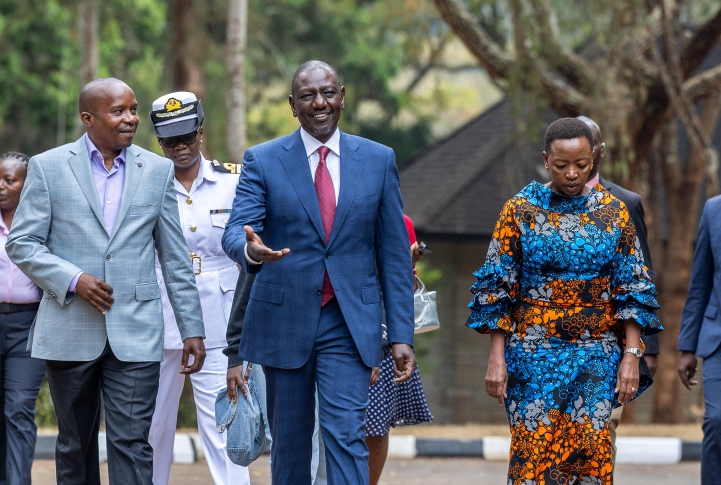![[PHOTOS] Ruto hosts Music Festival State Concert in Sagana](/_next/image?url=https%3A%2F%2Fcdn.radioafrica.digital%2Fimage%2F2025%2F08%2Fdb87f6f6-314f-40fe-9661-80c97425995c.jpg&w=3840&q=100)
 Deputy President Kithure Kindiki with President William Ruto and First lady mama Rachel at Sagana State lodge on August 16, 2025/PCS
Deputy President Kithure Kindiki with President William Ruto and First lady mama Rachel at Sagana State lodge on August 16, 2025/PCS President William Ruto has vowed to end decades of frustration in the creative industry by ensuring Kenyan artists finally receive their rightful share of royalties.
Speaking ON Saturday, when he hosted the 97th Kenya Music Festival State Concert at Sagana State Lodge in Nyeri County, the Head of State declared that the government will no longer tolerate middlemen siphoning off musicians’ earnings.
“I have met musicians from various regions and journals, and their complaint is always the same. The issue of royalties has been stuck in endless debate for too long. We must bring it to an end this year,” Ruto said.
The President stated that the Kenya Copyright Board (KECOBO) has begun enforcing the requirement that 70% of royalties go directly to artists.
He warned that Collective Management Organisations (CMOs) that fail to comply risk immediate loss of their licenses.
In a bold directive, Ruto ordered KECOBO to integrate a digital royalties collection and payment system into the government’s E-Citizen platform, even if it requires changes in legislation.
“We must get rid of middlemen and brokers who earn more than the artists themselves. The time to act is now,” he stressed.
Ruto also announced that the controversial black tape levy has already raised Sh100 million, funds that will go directly into supporting the creative industry under new distribution guidelines.
To further strengthen the sector, he said the government has rehabilitated key cultural centres such as the Kenya National Theatre and Bomas of Kenya, and is considering using housing levy funds to build additional hubs.
Counties, he added, are encouraged to decentralise talent development by establishing their creative industry centers.
“With these reforms, we are laying a foundation where Kenyan artists can thrive with dignity and receive at least 70% of the proceeds from their work,” Ruto assured.

















